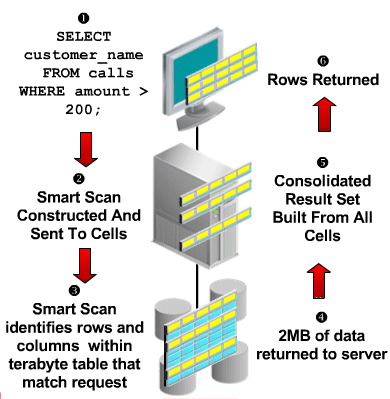1.2.10 Offloading Data Search and Retrieval Processing
Exadata Smart Scan offloads search and retrieval processing to the storage servers.
Smart Scan performs selected Oracle Database functions inside Oracle Exadata Storage Server. This capability improves query performance by minimizing the amount of database server I/O, which reduces the amount of I/O-related communication between the database servers and storage servers. Furthermore, the database server CPU saved by Smart Scan is available to boost overall system throughput.
Smart Scan automatically optimizes full table scans, fast full index scans, and fast full bitmap index scans that use the Direct Path Read mechanism, namely parallel operations and large sequential scans. The primary functions performed by Smart Scan inside Oracle Exadata Storage Server are:
-
Predicate Filtering
Rather than transporting all rows to the database server for predicate evaluation, Smart Scan predicate filtering ensures that the database server receives only the rows matching the query criteria. The supported conditional operators include
=,!=,<,>,<=,>=,IS [NOT] NULL,LIKE,[NOT] BETWEEN,[NOT] IN,EXISTS,IS OF type,NOT,AND, andOR. In addition, Exadata Storage Server evaluates most common SQL functions during predicate filtering. -
Column Filtering
Rather than transporting entire rows to the database server, Smart Scan column filtering ensures that the database server receives only the requested columns. For tables with many columns, or columns containing LOBs, the I/O bandwidth saved by column filtering can be very substantial.
For example, consider a simple query:
SQL> SELECT customer_name FROM calls WHERE amount > 200;In this case, Smart Scan offloads predicate filtering
(WHERE amount > 200) and column filtering (SELECT
customer_name) to the Exadata storage servers. The effect can be dramatic
depending on the table size, structure, and contents. For example, if the table contains
1 TB of data, but the query result is only 2 MB, then only 2MB of data is transported
from the storage servers and the database server.
The following diagram illustrates how Smart Scan avoids unnecessary data transfer between the storage servers and the database server.
Figure 1-2 Offloading Data Search and Retrieval

Description of "Figure 1-2 Offloading Data Search and Retrieval"
In addition to offloading predicate filtering and column filtering, Smart Scan enables:
-
Optimized join processing for star schemas (between large tables and small lookup tables). This is implemented using Bloom Filters, which provide a very efficient probabilistic method to determine whether an element is a member of a set.
-
Optimized scans on encrypted tablespaces and encrypted columns. For encrypted tablespaces, Exadata Storage Server can decrypt blocks and return the decrypted blocks to Oracle Database, or it can perform row and column filtering on encrypted data. Significant CPU savings occur within the database server by offloading the CPU-intensive decryption task to Exadata cells.
-
Optimized scans on compressed data. Smart Scan works in conjunction with Hybrid Columnar Compression so that column projection, row filtering, and decompression run in the Exadata Storage Servers to save CPU cycles on the database servers.
-
Offloading of scoring functions, such as
PREDICTION_PROBABILITY, for data mining models. This accelerates analysis while reducing database server CPU consumption and the I/O load between the database server and storage servers.
Parent topic: Key Features of Oracle Exadata System Software